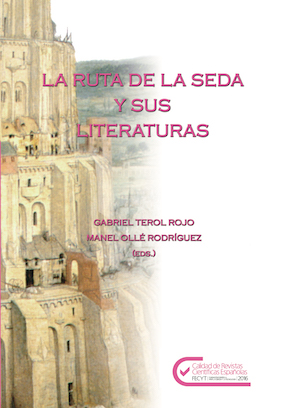Xina i l'Orient Llunyà en el relat de Benjamín de Tudela (segle XII). Realitats i fantasies
DOI:
https://doi.org/10.7203/qdfed.23.13467Paraules clau:
Xina, Índia, Orient, mites, viatges Resum
Resum
El text hebreu del relat dels viatges i itineraris del rabí Benjamín de Tudela (segle XII, circa 1165-1173) conté interessants i curioses dades ètniques, geogràfics, econòmics i mítics relacionats amb remotes latituds orientals: les tradicionals rutes comercials centreasiàtiques, l'Índia, Malabar, Tibet i la Xina, entre altres paratges. Informacions reals o fantàstiques que per ventura va haver d'arreplegar i anotar el jueu tudelà durant la seua llarga estada a Bagdad, o fruit de posteriors interpolacions i afegits a càrrec dels copistes.
 Descàrregues
Descàrregues
Descàrregues
Publicades
Com citar
-
Resum969
-
PDF (Español)762
Número
Secció
Llicència
 Este obra está bajo una licencia de Creative Commons Reconocimiento-NoComercial-SinObraDerivada 4.0 Internacional.
Este obra está bajo una licencia de Creative Commons Reconocimiento-NoComercial-SinObraDerivada 4.0 Internacional.
Tots els documents inclosos a OJS són d'accés lliure i propietat dels seus autors i/o institucions editores, i per tant, qualsevol acte de reproducció, comercialització, comunicació pública o transformació total o parcial necessita el consentiment exprés i escrit d'aquests.
________
Authors who publish with this journal agree to the following terms:
- Authors retain copyright and grant the journal right of first publication with the work simultaneously licensed under a Creative Commons Attribution License that allows others to share the work with an acknowledgement of the work's authorship and initial publication in this journal.
- Authors are able to enter into separate, additional contractual arrangements for the non-exclusive distribution of the journal's published version of the work (e.g., post it to an institutional repository or publish it in a book), with an acknowledgement of its initial publication in this journal.
- Authors are permitted and encouraged to post their work online (e.g., in institutional repositories or on their website) prior to and during the submission process, as it can lead to productive exchanges, as well as earlier and greater citation of published work (See The Effect of Open Access).




